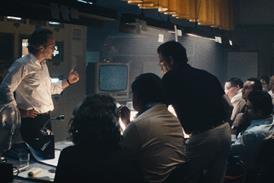Dir: Oliver Stone. US. 2003. 99mins.
For his first documentary, filmmaker Oliver Stone has chosen, in typically Stone fashion, a controversial subject: Cuban dictator Fidel Castro. Commandante provides a fascinating look at the man behind the iconic beard and cigar. But the subject is the only controversial thing about the film. Viewers who come looking for the critical edge of Stone the film-maker will be disappointed, for Stone's presence in front of the camera is more important than his role as its director. Essentially this is a series of conversations that serve to humanise one of America's bugbears. The result is a mutual admiration society but this may be a selling-point for urban liberals, for whom both men represent a challenge to the political mainstream.
With Iraq's Saddam Hussein at the centre of worldwide attention, interest in dictators who thumb their nose at the US must be at an all-time high. As Castro points out in the film, 'is it so bad to be a dictator' The US has been nice to all kinds of dictators.' Certainly the doc should find a place in specialised markets beyond the US; as well as premiering at Sundance, Comandante was also shown in the Panorama sidebar at Berlin. HBO has the film for the US, while Spain's Media Pro has secured sales to Italy's Mikado Films among others.
For more than 40 years, Fidel Castro has been a persistent thorn in the side of 10 consecutive US administrations. Culled from 30 hours of interviews, Comandante presents Castro in conversation with Stone as they discuss the highlights of the early years, intercut with archival footage of the revolution itself, the ill-fated US-backed Bay of Pigs invasion and the missile crisis of 1962. Castro talks about his equally iconic comrade Che Guevara and his personal philosophy. He is lured into revealing details of his personal life and tastes. He likes Chaplin films, Brigitte Bardot and, as one close-up exposes: Fidel Castro wears Nikes.
The film relies too much the charisma of its subject, who comes over as thoughtful and knowledgeable. There are too many shots of the process of making the film, the numerous video cameras operating in concert capturing every scratch of the bearded chin. There's a palpable sense of awe, as though the film-maker is continuously pinching himself and reminding the audience that this is the real thing.
The outings amongst the Cuban masses are convincing enough displays of Castro's popularity but the absence of a single dissenting voice says volumes. Stone fails to challenge Castro on the issues for which his regime is reviled: the lack of political rights including freedom of speech and the repression of homosexuals. Castro consented to be interviewed on the condition that he could stop the filming at any time: that no sequences are interrupted suggests nothing came between them.
This the third documentary on Castro in as many years, following 2000's conspiracy-tinged Dear Fidel, Marita's Story, directed by Wilfried Huismann; and Estela Bravo's 2001 Fidel, released theatrically last autumn in the US and criticised as being adulatory. No doubt Comandante will too.
Prod co: Media Produccion, Pentagrama Films, Morena Films, HBO
Int'l sales: Mediapro
Prods: Fernando Sulichin, Stone
DoP: Rodrigo Prieto, Carlos Marcovich
Ed: Alex Marquez, Elisa Bonora
Music: Alberto Iglesias



















No comments yet